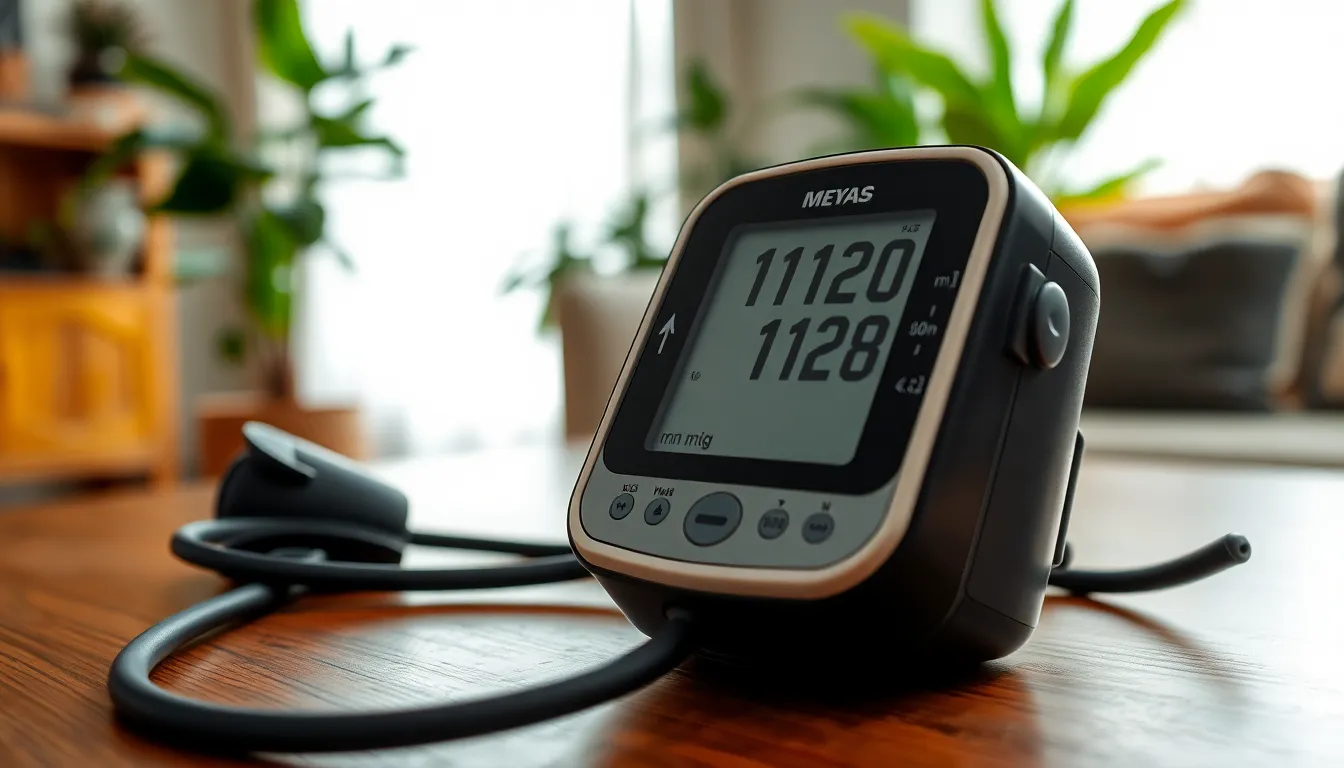When it comes to blood pressure, numbers can feel like a game of bingo. But if you’re sitting pretty at 111 over 75, you’ve hit the jackpot! This delightful duo not only sounds impressive but also signals a healthy heart and a happy life.
Table of Contents
ToggleUnderstanding Blood Pressure
Understanding blood pressure is essential for recognizing health status. A reading of 111 over 75 reflects a healthy cardiovascular function.
What Is Blood Pressure?
Blood pressure measures the force of blood against artery walls. It consists of two numbers: systolic pressure, the first number, indicates heartbeats. Diastolic pressure, the second number, represents heart resting between beats. Doctors utilize these values to evaluate heart health. Normal blood pressure typically ranges from 90/60 to 120/80 mmHg. Readings outside this range warrant further examination.
Importance of Maintaining Healthy Levels
Maintaining healthy blood pressure levels lowers the risk of serious health issues. Elevated blood pressure can lead to heart disease, stroke, and kidney problems. A reading like 111 over 75 signals a strong heart, promoting overall well-being. Regular monitoring helps identify potential problems early. Lifestyle choices such as diet and exercise play a significant role in maintaining optimal levels. Positive adjustments can enhance long-term health and reduce risks.
What Does 111/75 Blood Pressure Mean?

A blood pressure reading of 111 over 75 indicates a healthy and optimal level. This measurement reflects how well the cardiovascular system functions.
Breakdown of Systolic and Diastolic Numbers
Systolic pressure stands at 111 mmHg, which occurs during heartbeats. This number indicates how much pressure blood exerts against artery walls when the heart pumps. Diastolic pressure, at 75 mmHg, occurs when the heart is at rest between beats. This number shows the pressure present in the arteries when the heart is not contracting. Both readings are essential in assessing cardiovascular health.
Comparison with Normal Blood Pressure Ranges
Normal blood pressure readings typically range from 90/60 to 120/80 mmHg. A measurement of 111/75 falls well within this range, making it an excellent indicator of overall health. Readings below 90/60 may indicate low blood pressure, while those exceeding 120/80 can signal elevated risks. Understanding these ranges helps individuals monitor their cardiovascular health effectively.
Causes of 111/75 Blood Pressure
Blood pressure readings such as 111/75 can stem from various factors, including diet and lifestyle choices. Understanding these influences helps maintain and improve cardiovascular health.
Dietary Influences
A balanced diet significantly impacts blood pressure levels. Foods rich in potassium, such as bananas and sweet potatoes, help regulate sodium levels and promote healthy blood pressure. Omega-3 fatty acids found in fish like salmon and walnuts also contribute to cardiovascular health. Reducing salt intake assists in lowering hypertension risks. Consuming whole grains, fruits, and vegetables sets the foundation for optimal blood pressure control. These dietary choices create a well-rounded approach to maintaining healthy numbers.
Lifestyle Factors
Physical activity plays a crucial role in blood pressure management. Regular exercise strengthens the heart, improves blood circulation, and can lead to lower blood pressure readings. Stress management techniques, including yoga and meditation, support emotional well-being and can positively affect blood pressure. Avoiding tobacco products is vital, as smoking contributes to increased blood pressure over time. Furthermore, limiting alcohol intake reduces the risk of hypertension. These lifestyle adjustments encourage a healthier blood pressure and overall better cardiovascular health.
Health Implications of 111/75 Blood Pressure
A blood pressure reading of 111/75 indicates a strong cardiovascular state, but understanding its implications for health remains crucial.
Potential Risks
Maintaining a reading of 111/75 generally poses minimal risk. However, fluctuations in blood pressure can occur due to stress, poor diet, or inactivity. Persistent deviations, even slightly above or below ideal ranges, may signal the onset of health issues. Individuals with underlying conditions may experience heightened risks. Close monitoring becomes essential when changes arise. Prevention strategies help mitigate these risks, allowing individuals to enjoy better heart health.
Benefits of Optimal Blood Pressure Levels
Optimal blood pressure levels contribute significantly to overall health. Achieving a reading of 111/75 supports proper blood flow, enhancing organ function and reducing the risk of heart disease. Individuals with this reading often experience fewer cardiovascular complications. Additionally, maintaining such levels promotes well-being, encouraging an active lifestyle. Lifestyle factors like a balanced diet and regular exercise further solidify these benefits, creating a foundation for enduring health. Embracing these habits ensures ongoing cardiovascular success.
A blood pressure reading of 111/75 is a strong indicator of cardiovascular health. It reflects a balance that supports overall well-being. By prioritizing healthy lifestyle choices, individuals can maintain this optimal level and further reduce their risk of serious health issues.
Regular monitoring of blood pressure is essential to catch any potential fluctuations early. Embracing a diet rich in nutrients and engaging in physical activity can significantly enhance heart health. Ultimately, understanding and managing blood pressure is a crucial step toward a healthier, more active life.





